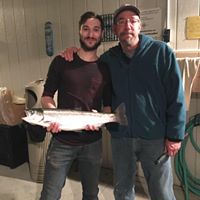Which fish is traditionally eaten for Christmas dinner in many Eastern European countries?
To those of us raised on the tradition of a roast bird of some description being the centrepiece of our Christmas tables, the very notion of having fish instead may seem bizarre. But in many Eastern and Central European countries, including Poland, Slovakia, and the Czech Republic, also further west in Germany and Austria, that is the traditional Christmas meal.
Some of the reasons for this are religious. In Roman Catholic tradition, Advent was seen as a time of fasting (not unlike Lent) and Christmas Eve was, in fact, the last day of the fasting period, with meat not being allowed. But even now, when that's no longer so, even folk who are not particularly religious still follow the tradition.
Diehard traditionalists buy their Christmas carp alive, and keep it in the bath (it is, after all, a bottom-feeder) until it is time to cook it. It is not unknown for children to even regard it as a temporary pet and give it a name. But increasingly there is a trend for the fish to be bought already decidedly dead.
Traditional accompaniments include potato salad and bread, with dessert being cookies or strudel. Strong local spirits may also be drunk!
Unlike many other fish, carp is not in short supply and is nearly always caught locally. With its profusion of bones, it is not the easiest fish to eat, but its devotees would say it is worth it, both for tradition and taste.
More Info:
theculturetrip.com













